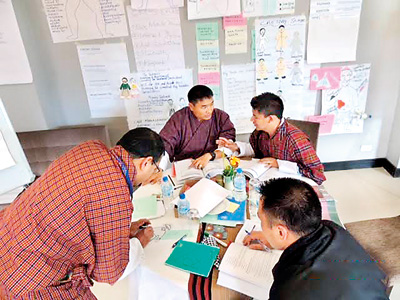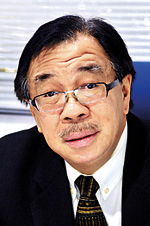In the forefront of the battle against drug addiction
To say that Tay Bian How is well-travelled is an understatement. As Director of the International Centre for Certification and Education of Addiction Professionals (ICCE) of the Colombo Plan, he has seen much more than the diversity and rich heritage of the numerous countries he has visited. His conversation is imbued with his memories and recollections of the people he has encountered on his trips.

Focus on education: National trainers from Bhutan in a group activity
The training and credentialing arm of the Drug Advisory Programme, ICCE was established in 2009. Funded by the Bureau for International Narcotics and Law Enforcement Affairs, US Department of State, it has the status of an International Certified Education Provider of the United States National Association of Alcohol and Drug Abuse Counsellors and has developed credentialing levels for treatment and prevention specialists.
“I came to this field not by choice, but by default” explained Tay, who had experience working for the Ministry of Health, Malaysia. Although he had a background in Public Administration, he found himself studying substance abuse at John Hopkins Bloomberg School of Public Health. “Since then there has been no turning back,” he smiled.
A problem that knows no geographical or other boundaries, the World Drug Report 2014 estimated that in 2012, 243 million people of the world population aged 15-64 had used an illicit drug. “Most countries use religious approaches to curb the problem,” observed Tay. The approach adopted by the ICCE however, is one cemented by science. The commission consists of professionals in the field, policy makers from participating countries along with educators who meet bi-annually to regulate and update the training curricula for both prevention and treatment credentials, thus continually “raising the bar” when it comes to education and rehabilitation of users.
No longer painted as the role of counsellor or volunteer, the ICCE’s goal is to change the entire basis of the career they refer to as a Prevention or Treatment Professional. To date they are the proud educator of more than 300 credentialed treatment addiction professionals from Guatemala to the Middle East and Central Asia. Sri Lanka even saw the emergence of six trainers mostly from NGOs and national bodies who will now be internationally recognized trainers.

Tay Bian How
The ICCE credentials fall into two categories; prevention and treatment. The curricula isn’t limited to the recovery of the individual only and has branches extending to family, “It’s not just a disease of the person but also a disease of the family,” he says. “Three times more women and children were users, rather than men,” he recalled of his visit to Afghanistan. The training has specialized branches for women such as GROW and children and teenagers as well.
Feeling very much at home in Sri Lanka since arriving in 2000 , Tay surprisingly observed that the drug problem was not as alarming- having experienced many a Lankan dinner party and local hospitality where liquor flowed far more freely. Compared to rural areas the illicit trade and use of drugs are more popular in “bright light” cities and urban regions.
What makes rehabilitation of drug users such a difficult process lies in the fact that there is no final remedy to cure addiction. “It can only be managed,” he says, which is why specialized treatment is so important. Another obstacle, he himself admits is the stigma that is still associated with drug addiction even in this day and age; which is very common in Asian culture. A subject that is most often spoken of very lightly on the surface, he feels that we have yet to accept the cold reality of drug addiction; regardless of whether it is illicit or not.
“Most times the stigma is usually to protect them from shame.” But the danger, according to Tay is in denial. “The longer you wait, the worse it gets,” he stresses. Negligence, parenting shortcomings, and pressure from schools were the chief reasons for drug addiction in youngsters. “The missing link, when that happens is support.” It is thus that the ICCE place much emphasis on treatment as a family, and community; although the latter has proven to be harder to implement.
At a workshop organized in the Philippines, several of the participants who were current addicts expressed their primary reason for turning up at the event. “We want to be recognized,” was their motivation for participating. Most of the trainers have been users themselves, who take up the curricula. “Some can’t pass Math or Science. But this is something they know and can understand,” with many even offering to pay for the courses so that they can be licensed professionals. “At the end of the day the drug problem is not only the government’s responsibility. Everyone has a role to play. ”
For information visit the Colombo Plan website at www.colombo-plan.org/icce or email icceinfo@colomboplan.org


